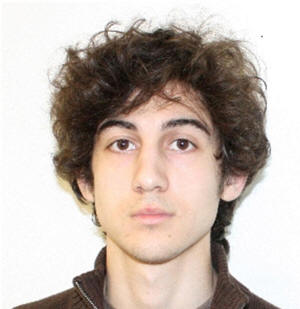U.S. Supreme Court restores Boston Marathon bomber's death sentence
 Send a link to a friend
Send a link to a friend
 [March 05, 2022]
Lawrence Hurley and Nate Raymond [March 05, 2022]
Lawrence Hurley and Nate Raymond
WASHINGTON (Reuters) -The U.S. Supreme
Court on Friday reinstated convicted Boston Marathon bomber Dzhokhar
Tsarnaev's death sentence for his role in the 2013 attack that killed
three people and wounded more than 260 others, ruling in favor of the
federal government.
In a 6-3 decision, the justices sided with the Justice Department's
challenge to a 2020 federal appeals court ruling that had upheld
Tsarnaev's conviction but overturned his death sentence. Because
President Joe Biden's administration has imposed a moratorium on the
death penalty in federal cases, Tsarnaev does not face imminent
execution.
White House Press Secretary Jen Psaki told reporters that Biden
"believes that Tsarnaev should be punished" but also has "grave concerns
about capital punishment as implemented."
The Supreme Court faulted the Boston-based 1st U.S. Circuit Court of
Appeals on its findings that Tsarnaev's right to a fair trial under the
U.S. Constitution's Sixth Amendment was violated and that the trial
judge wrongly excluded certain evidence about a separate crime.
"Dzhokhar Tsarnaev committed heinous crimes. The Sixth Amendment
nonetheless guaranteed him a fair trial before an impartial jury. He
received one," conservative Justice Clarence Thomas wrote for the court.
The court's six conservative justices were in the majority, with its
three liberals dissenting.

Biden as a candidate promised to work to pass legislation in Congress to
eliminate the death penalty at the federal level and set incentives for
states to do so as well, instead endorsing life sentences without
probation or parole.
But his administration last year opted to proceed with an appeal
initially launched by the Justice Department under his predecessor
Donald Trump to defend Tsarnaev's death sentence.
"Legal rulings don't erase trauma and pain. Our focus today, and always,
is on the hundreds of families that were deeply impacted and traumatized
by this horrific act of domestic terrorism," Boston-based U.S. Attorney
Rachael Rollins, the federal prosecutor in charge of the case, said in a
statement.
In a dissenting opinion, liberal Justice Stephen Breyer agreed with the
1st Circuit that evidence about the separate crime, a 2011 triple murder
in Waltham, Massachusetts linked to Tsarnaev's older brother Tamerlan,
was improperly excluded.
Lawyers for Tsarnaev, who is 28 now and was 19 at the time of the
attack, have argued that he played a secondary role in the bombing to
his brother, who they called "an authority figure" with "violent Islamic
extremist beliefs." As such, the evidence about another crime Tamerlan
allegedly committed would be relevant, they argued.

[to top of second column]
|

Dzhokhar Tsarnaev, 19, suspect in the April 15, 2013, Boston
Marathon bombing, is pictured in this undated FBI handout photo.
REUTERS/FBI/Handout
 "This evidence may have led some
jurors to conclude that Tamerlan's influence was so pervasive that
Dzhokhar did not deserve to die for any of the actions he took in
connection with the bombings, even those taken outside of Tamerlan's
presence," Breyer wrote.
"And it would have taken only one juror's change of mind to have
produced a sentence other than death, even if a severe one," added
Breyer, who in the past has questioned the death penalty's
constitutionality.
The primary source of the evidence about the other murders, a man
named Ibragim Todashev, was killed by an FBI agent in 2013 when he
attacked officers during an interview.
The Supreme Court also found that the trial judge did not violate
Tsarnaev's right to a trial in front of an impartial jury by failing
to properly screen jurors for potential bias following pervasive
news coverage of the bombings.
CONVICTED ON ALL COUNTS
The Tsarnaev brothers detonated two homemade pressure-cooker bombs
at the marathon's finish line on April 15, 2013, and days later
killed a police officer. Tamerlan Tsarnaev died after the gunfight
with police.
Jurors convicted Dzhokhar Tsarnaev in 2015 on all 30 counts he faced
and determined he deserved execution for a bomb he planted that
killed Martin Richard, 8, and Chinese exchange student Lingzi Lu,
23. Restaurant manager Krystle Campbell, 29, was killed by the
second bomb.
Marc Fucarile, who lost his right leg in the second blast, said the
Supreme Court "did the right thing" and that the three dissenting
justices "should be ashamed." Fucarile said he has no confidence
Tsarnaev's death sentence will be carried out, especially under
Biden's administration.
"He got what he deserves," said Fucarile, 43. "I think we need to
send a message: you can't just kill innocent people and set off
bombs in crowds of people."

Mikey Borgard, who sustained hearing loss and a brain injury in the
attack, attended Tsarnaev's trial and opposes executing anyone.
Borgard called the Supreme Court's ruling "not only erroneous in its
logic but shamefully lacking in its moral and ethical fiber."
No federal inmates were executed for 17 years before Trump oversaw
13 executions in the last six months of his presidency.
(Reporting by Lawrence Hurley; Additional reporting by Nate Raymond
and Katharine Jackson; Editing by Will Dunham)
[© 2022 Thomson Reuters. All rights
reserved.] This material may not be published,
broadcast, rewritten or redistributed.
Thompson Reuters is solely responsible for this content. |